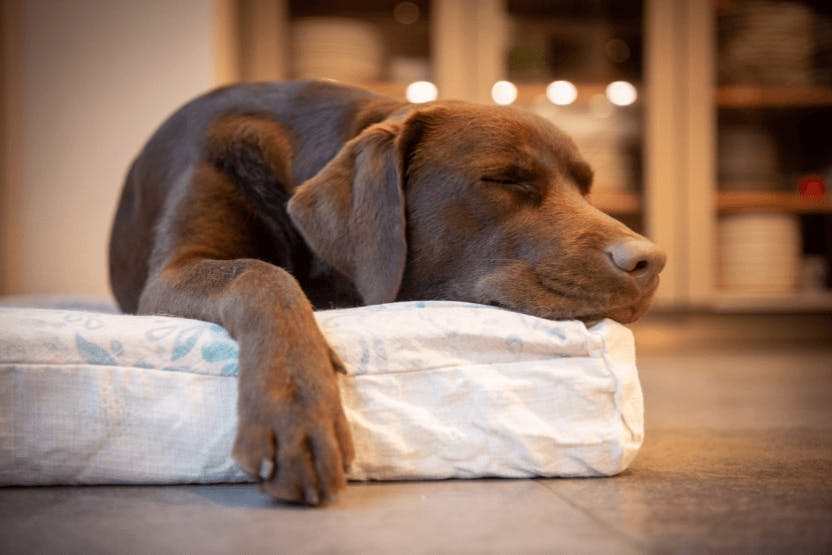
By Emily Bayne
Published: 03/04/2022, edited: 03/04/2022
Avoid expensive vet visits
Get peace of mind from the comfort of your home
Chat with a veterinary professional directly in the Wag! app
Return with more questions any time, any day
- Trouble stirring
- Behavioral changes
- Skipping meals or potty breaks
- Drinking more or less than usual
- Sudden loss of interest in things they once enjoyed
- Falling asleep abruptly while engaged in an activity
- Abnormal breathing while sleeping (particularly if they stop breathing for short periods)
- They need to go out. Sometimes, nighttime restlessness in dogs is as simple as needing to use the bathroom before bed.
- Separation anxiety. Dogs with separation anxiety can have difficulty falling asleep when away from their parents. These dogs may whine, pace, and become destructive while their guardians sleep, especially if they're in a different room.
- Bumps in the night. Overly vigilant dogs may have a harder time falling and staying asleep, particularly if they live in a noisy area. Wind, sirens, and the sound of cars may cause dogs to wake frequently and have trouble getting to sleep in the first place.
- Thunderstorms. Dogs with thunder phobia often become restless and stay awake shaking and hiding on stormy nights.
- Understimulation. High-energy dogs might find it hard to wind down at night if they don't get enough exercise and mental stimulation during the day.
- Age-related cognitive changes. Cognitive changes like canine dementia can cause dogs to become confused and restless at night.
- Discomfort. Temperature drops at night can exacerbate joint conditions like arthritis, causing dogs to lose sleep. What's more, arthritic dogs might be reluctant to rest since prolonged periods in one position can increase joint inflammation. Skin conditions, especially those that cause intense itching, can make it difficult for dogs to sleep soundly.
- Estrus. Females in heat may become restless and even try to escape at night. Likewise, intact dogs who detect a female in heat may have trouble sleeping.
- Make sure they get plenty of exercise and mental stimulation during the day — this means walks, playtime, and busywork (like food puzzles and chews).
- CBD dog treats may help your dog relax at bedtime. CBD products also have the added benefit of reducing pain and inflammation, so this might be a good choice for dogs who have arthritis flare-ups at night.
- Take your pup out to potty right before bedtime to prevent nighttime accidents and avoid wake-up calls in the middle of the night.
- Try massaging your dog to sleep. Like humans, most dogs find massages relaxing, and a little rub-down might be all your pet needs to get some shut-eye.
- If you think pain or discomfort is interfering with your dog's sleep schedule, take them to the vet for a check-up. Ask your vet about pain relievers for your pup to help them feel more comfortable at bedtime.

